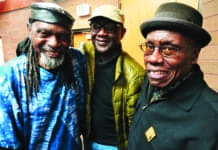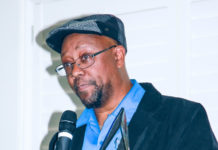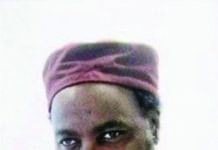by Minister of Information JR

We are going to be talking about the Internet and all of this new stuff going on – WikiLeaks, net neutrality and what is happening to this democratic library that we called the internet that was formed by the U.S. government. Davey, how are you?
Davey D: I’m good, man, I’m good. A lot of stuff is going on. Man, we’re at a crossroads where I think 10-15 years from now, people will look back and ask a very profound question to each of us. They are going to ask, what side of history did you stand on and what did you do? You know, in terms of what steps did we do to protect and ensure freedom of speech and what steps did we take to make sure that people had equal access to being able to talk to their communities without having corporate middle men or government middle men step in and reinterpret our messages towards one another. That is what I think is happening right now. You see that playing itself out on the internet as we speak.
JR: Well, let’s back up a little bit and let’s start with what has been dominating the media lately – WikiLeaks this and WikiLeaks that. There have been number of documents that they have said were stolen from the United States government and basically put on blast on a website called WikiLeaks. Can you talk a little bit about the significance of this case? Not necessarily from a criminal background but by way of setting up internet policy – what does this case mean to that?
Davey D: Well, I think the WikiLeaks case, in terms of the information that was put out there, is not as damaging as it’s being hyped up to be. I think it’s probably more embarrassing than it is damaging. Meaning, I don’t think no one is going to get killed over it, nobody’s cover was blown or nothing like that.
But what’s interesting – why everybody needs to pay attention – is that it falls into a plan of action where people can say we can use this excuse to start taking some bold steps to shut down parts of the internet. Different sites we can play around and see what we can get away with under the auspices of people violating some sort of security laws or national security laws or treason laws and all that.
So in other words, this is the 9-11 of the internet. You know after 9-11, they were able to come up with all types of laws that now make it very difficult for us to do certain things. Surveillance laws now make our privacy all but gone. So now with the internet and this WikiLeaks thing, they are going hmmmm, let’s call up some corporations that we know, like Amazon or something like that, and pressure them to pull down the WikiLeaks and not make it available for people.
All of sudden, that corporation is caving in and you are going, why would you do that? In many ways, this is a journalist, who doesn’t live in this country, who exposed some information. Why can’t people who want to read this information be allowed to do it?

Just like now, if they say they are going to put a street lamp up or a camera in the middle of an intersection, we don’t trip. Ten years ago we would have. Now we just go, well, you know, 9-11 happened and we need to catch the criminals; you know, the war on terror. So now we just allow it to happen.
Now because of WikiLeaks, when the U.S. government comes along and says let me shut down the Block Report website, they can do so and say, well, he is violating national security. And everybody will just nod their head and go, well, you shouldn’t have done that. That’s what I think is really the underlying story with WikiLeaks.
Now because of WikiLeaks, when the U.S. government comes along and says let me shut down the Block Report website, they can do so and say, well, he is violating national security.
And I’ll say it like this: Pay attention to Sen. Joe Lieberman because he has been the one leading the charge. He is the guy that sits on the Homeland Security Committee in the Senate. He has been the one to call up Amazon and say, hey, y’all need to pull that off – and they did it. There is a company in Seattle called Tableau. He’s the one that called them up and said don’t be messing with WikiLeaks – and these guys didn’t even have the WikiLeaks cables on their site. They just were reporting who’s talking about it. He shut them down.
All of sudden, students and schools are being issued warnings saying if y’all read these WikiLeaks things, you are going to be in violation of U.S. law. Since when did this become a violation? I can’t read something all of a sudden because you told me I can’t read it – and it’s available to me? So that’s a new one on me. I ain’t never seen that happen before. Everyone in the State Department was told that if they read any of those documents, that’s going to be treason. They are going to be in violation of the law.
JR: Just reading it?
Davey D: Just reading it. So, I think what you are talking about is people are saying how much can we push before people start objecting? And what we are going to do is say that national security is at stake and use that as the excuse to kind of push these laws.
Let’s say you have the WikiLeaks thing up on your site. Right now they might say, let’s seize JR’s domain and shut his site down. They didn’t come talk to you. They didn’t ask you how you got it. They didn’t ask you why you got it.
I mean you are a journalist. Maybe you got a source that gave you that. That should mean you are allowed to present that to your public. They didn’t give you your due in court. They just shut your site down. And I think they are going to see how often and how many they can do this with before they hit a bump in the road and people start resisting.
JR: I understand that recently there have been a number of internet sites seized by Homeland Security. Can you shed some light on that?
Davey D: Well, that’s kind of what I was talking about that’s connected to that. Not just to WikiLeaks, but the RIAA, which is the recording industry’s legal arm – which represents the major labels as well as the music industry – have been saying they have been having copyright infringement problems. They’ve basically been working on a bill that’s going to the Senate pretty soon called COICA (Combating Online Infringement and Counterfeit Act), which will definitely give a lot of teeth to shutting down sites and all that.
But in the meantime, Homeland Security, the Copyright Intellectual Property Coordinating Committee or something like that, and ICE have all been teaming up at the request of some of these corporation media outlets. They have been going around saying that this website here is a copyright infringer; shut it down. They shut down the whole entire website.

So to me that is a very dangerous precedent because all of us should be given our due process and that’s not happening. What makes it even more troubling is there ain’t no laws in the book that say the United States is allowed to do this. So where did this come from and how did this happen? There are questions that are raised for the sites that they shut down. Who exactly said that there was copyright infringement? Where is the proof? Did you talk to the people that are accused of copyright infringing?
For example, I may buy a record from you. You tell me, this is my record and you are buying it from my store. I get a receipt. I go put it up on my site, daveyd.com, and Warner Brothers comes along and says, man, that’s our record. I didn’t know you sampled from Warner Brothers. I didn’t know you took part of their music. I bought the record from you. But they are going to shut down my entire site with 15-20 years worth of information and just call it a day. That’s what’s happening right now as we speak.
JR: Well, last but not least, let’s tie in this other issue that’s been going on for years: net neutrality. I know that the issue around net neutrality is heating up. Can you define it for the audience and can you let us know what the new developments or the new maneuvers that the government is making using the help of former Black Panther and congressman, Bobby Rush?
Davey D: For people that do not know, net neutrality means that everybody’s information on the internet is one click away. If the Block Report has a story, all I have to do is make one click and I go to the Block Report. If I want to go to the New York Times, I make a click and I go to the New York Times. What the big media corporations want to do is make it so that if I want to get the Block Report, I got to make three clicks. So if I want to read a story you got, I got to go click one, click two, click three. But if I want to go see the New York Times, I just click once.
Basically, what the telecom companies, who control a lot of the internet, are saying is, sure, JR, you want to have your story available to the public? Pay us a bunch of money and you can be one click away as well. So that is basically setting up a tiered internet, so that those who are rich, their stories will show up first. Those who are poor, their stories will show up last or not at all. That’s been the big fight. And it looks like the president has been caving in on that and as you mentioned, Bobby Rush, former Black Panther, has been pushing the agenda of the telephone industry – AT&T in particular.
It’s basically setting up a tiered internet, so that those who are rich, their stories will show up first. Those who are poor, their stories will show up last or not at all.
They have been the ones leading the charge trying to get rid of net neutrality. Him, Jesse Jackson and some of the traditional civil rights organizations have all lined up after they got money in the pocket and funding for some of their pet projects. They are all of a sudden saying this isn’t a bad idea after all – to get rid of net neutrality – which is crazy especially for someone who was a former Black Panther. He of all people knows the importance of being able to communicate to the masses uninhibited.
JR: No doubt. What is it that we can do, besides watch, to fight this government encroachment onto our rights on the internet as well as our right to information and our right to freedom of speech?
Davey D: Well, I think any time your right of freedom of speech is put in jeopardy, you got to fight for it in any which kind of way. Call your Congress people. Make noise in the streets. Make that the topic of conversation, not Nicki Minaj vs. Lil’ Kim. If you are, learn how to make that a part of the net neutrality conversation. You know, like, gee, JR, you know we might not be able to see this video of Nicki Minaj if there is a net neutrality situation. Tie this in.
Make this an awareness thing because once the rules get put in place, it’s going to be very hard to reverse them. Especially over the next couple of years with a different type of Congress coming in. They are definitely not trying to hear that. The Republicans more so than the Democrats are like, naw, we are not trying to hear that at all – because they get the most money from some of these corporations. So my thing is, make a lot of noise about it. If you think you know Congress people or senators that can make a difference, give them a call and let them know. Protect net neutrality and, overall, increase the awareness.
JR: Right on, Davey D. For those of you that are just tuning in and who got to us a little bit late, you were listening to the voice of legendary hip hop journalist Davey D from Hard Knock Radio, Breakdown FM and daveyd.com as he broke down what is going on with the internet while we are looking at the WikiLeaks story or we are looking at the website seizure story as well as net neutrality. What’s next on the horizon? You heard it right here, with the Minister of Information JR on blockreportradio.com. Until next time, we out.
Davey D: Peace
Email POCC Minister of Information JR, Bay View associate editor, at blockreportradio@gmail.com and visit www.blockreportradio.com.

 Store
Store












